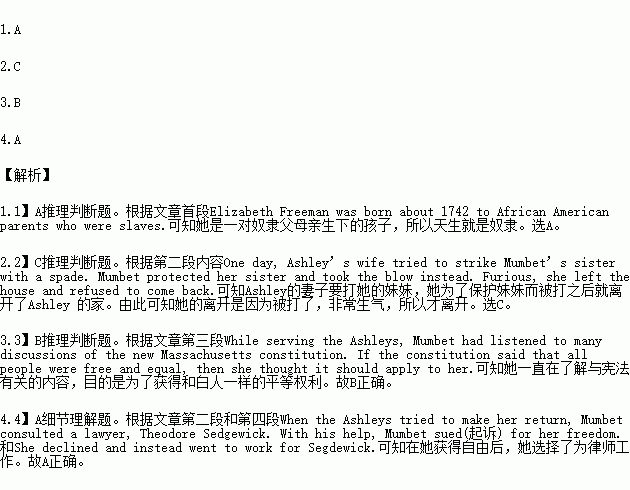题目内容
Elizabeth Freeman was born about 1742 to African American parents who were slaves. At the age of six months she was acquired, along with her sister, by John Ashley, a wealthy Massachusetts slaveholders. She became known as “Mumbet” or “Mum Bett.”
For nearly 30 years Mumbet served the Ashley family. One day, Ashley’s wife tried to strike Mumbet’s sister with a spade. Mumbet protected her sister and took the blow instead. Furious, she left the house and refused to come back. When the Ashleys tried to make her return, Mumbet consulted a lawyer, Theodore Sedgewick. With his help, Mumbet sued(起诉) for her freedom.
While serving the Ashleys, Mumbet had listened to many discussions of the new Massachusetts constitution. If the constitution said that all people were free and equal, then she thought it should apply to her. Eventually, Mumbet won her freedom---- the first slave in Massachusetts to do so under the new constitution.
Strangely enough, after the trial, the Ashleys asked Mumbet to come back and work for them as a paid employee. She declined and instead went to work for Segdewick. Mumbet died in 1829, but her legacy lived on in her many descendants(后裔). One of her great-grandchildren was W.E.B. Du Bois, one of the founder of the NAACP, and an important writer and spokesperson for African American civil rights.
Mumbet’s tombstone still stands in the Massachusetts cemetery where she was buried. It reads, in part: “She was born a slave and remained a slave and remained a slave for nearly thirty years. She could neither read nor write, yet in her own sphere she had no superior or equal.”
1.What do we know about Mumbet according to Paragraph 1?
A. She was born a slave
B. She was a slaveholder
C. She had a famous sister
D. She was born into a rich family
2.Why did Mumbet run away from the Ashleys?
A. She found an employer
B. She wanted to be a lawyer
C. She was hit and got angry
D. She had to take care of her sister
3.What did Mumbet learn from discussions about the new consititution?
A. She should always obey her owners’ orders
B. She should be as free and equal as whites
C. How to be a good servant
D. How to apply for a job
4.What did Mumbet do after the trial?
A. She chose to work for a lawyer
B. She found the NAACP
C. She continued to serve the Ashleys
D. She went to live with her grandchildren
 同步轻松练习系列答案
同步轻松练习系列答案 课课通课程标准思维方法与能力训练系列答案
课课通课程标准思维方法与能力训练系列答案阅读填空
Food makes us feel good, but some people eat when they aren’t really hungry and eat to simply feel good. This kind of eating habit is called emotional eating, which does not affect adults but also young children. It isn’t a good thing.
A child’s eating habits can develop right from childhood. As we know, a baby cries out if he doesn’t get milk at the usual time of the day. However, sometimes parents immediately stick a bottle in a child’s mouth without trying to find out if the child is really hungry. In fact, children may cry for other reasons. Even as children grow up and start going to school, parents sometimes give them a chocolate bar if they become really unhappy. As the children further grow up, they may become used to having a snack whenever they’re upset or low.
Therefore, they’d like to eat an emotional snack when they have the feeling of unhappiness and boredom. Even when they don’t get high grades, aren’t popular at school or made fun of by others, they will want something to eat. After having the snack, they feel a lot better.
Emotional eating in young children is a thing that needs to be taken seriously. To protect your children from emotional eating, you should satisfy your child’s emotional needs in the best possible way. This includes spending time with your child every day, taking an interest in his school work, helping your child study, providing a health environment without tension at home, etc. Don’t make the child lose face by scolding him. Develop confidence in your child. Make your child eat enough once in a while. Reward him for his achievements.
All this will help your little one develop a healthy eating habit. And always remember love and care is the key to help you child out of trouble and grow up happily.
Title: 1. in Young Children
Definition | Eating for feeling good instead of for 2. . |
Causes | forming the habit when they are 3.. feeling 4.. feeling getting low grades and feeling 5.. being made fun of by others |
6.. | staying with your child for some time every day being 7. in your child’s studies and help him study providing a healthy environment without tension at home avoiding 8. to make him ashamed making your child 9. in himself giving your child enough to eat once in a while giving your child reward for what he has achieved |
10. | Love and care helps children out of trouble. |

